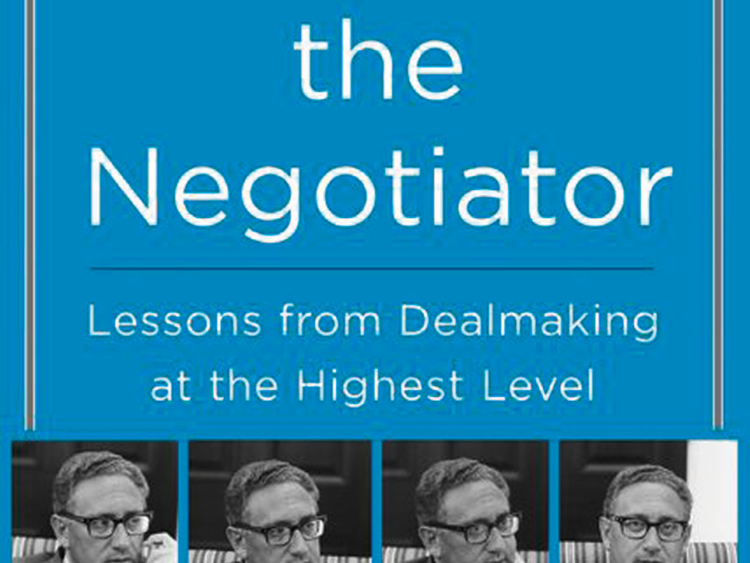By James K. Sebenius, R. Nicholas Burns and Robert H. Mnookin, Harper, 411 pages, $28.99
Although American foreign policy often sounds absolutist — “you are with us or against us” — the successful practice of diplomacy requires compromise. No nation is powerful enough to get whatever it wants unilaterally, and the complexities of international affairs make it impossible to control the course of events.
The great statesmen in American history — Benjamin Franklin, Thomas Jefferson and Franklin Roosevelt, among others — were all negotiators. They spent much of their time meeting with allies and adversaries to hammer out agreements that reconciled divergent interests. Franklin persuaded the French monarchy to aid American anti-monarchists fighting for independence. Jefferson worked with another French ruler, Napoleon, to send Paris needed cash in return for doubling the landholdings of the United States. And Roosevelt, of course, procured Soviet Communist and British imperialist contributions to American anti-Communist and anti-imperialist aims in fighting fascism. Wars are indeed won and lost at the negotiating table.
Few American statesmen have understood this history as well as Henry Kissinger. He made his early career as a scholar, arguing that American leaders had to reject the rigidity of mutually assured nuclear destruction. He advocated a more sophisticated mix of military pressures and diplomatic overtures, hoping to induce agreements from the Soviet Union that would stabilise a divided Europe, limit the growth of nuclear arsenals and manage rivalries in other regions.
During his years as President Nixon’s and President Ford’s most influential foreign policy adviser, 1969-77, Kissinger put these ideas to work. He participated in marathon haggling sessions with some of the most battle-hardened figures of the 20th century, including Zhou Enlai, Leonid Brezhnev, Anwar Sadat, Yitzhak Rabin, Hafez Al Assad and Ian Smith. Kissinger appeared to succeed in many of these negotiations — opening relations with China, forging a detente with the Soviet Union, bringing a precarious peace to the Middle East, and speeding the end of white rule in Rhodesia. He became the wise man of American foreign policy — a ubiquitous advocate for strategic compromises to secure stability for the United States. Now a 95-year-old private citizen, he continues to negotiate on behalf of wealthy clients and elected leaders who seek influence in foreign lands.
How does he do it? The authors of Kissinger the Negotiator, James K. Sebenius, R. Nicholas Burns and Robert H. Mnookin, are an all-star trio of experts on negotiation in business, law and diplomacy. They have focused on Kissinger because he is unsurpassed for the range and intensity of his negotiations as national security adviser and secretary of state. He has also left a long documentary trail, including thousands of pages that he has written recounting what he did when seated across from so many adversaries and other interlocutors. The authors spent many hours interviewing Kissinger, and he has written a short preface blessing their analysis as a whole.
Kissinger appears in this account as a quick learner, a bold strategist and a relentless pursuer. In Rhodesia, he orchestrated a series of pressures on Ian Smith from multiple directions to push the stubborn defender of white rule to accept a two-year transition to majority governance. In the Middle East, he tirelessly travelled between capitals to knit together compromises among antagonistic leaders. In China, probably his most famous triumph, Kissinger probed a series of neglected routes to establish communication and avoid recurring controversies, particularly the future status of Taiwan.
The authors provide play-by-plays for many of the negotiations, but they have little new to say about them, and they leave out a lot. The historical sections are written almost exclusively from the American side of the negotiating table, and the loudest voice is always Kissinger’s own from his memoirs, interviews and the contemporary documentary record. The authors have read many critical accounts challenging Kissinger’s negotiating efficacy, and the consequences of his choices, but these accounts are mostly relegated to footnotes and textual asides. The one partial exception is their discussion of the Vietnam War, in which the authors posit that Kissinger’s negotiations may have prolonged a failing American military strategy and increased the death toll. Yet they praise his efforts to negotiate the Paris Accords that led to the delayed American withdrawal in 1975.
Sebenius, Burns and Mnookin identify 15 lessons from Kissinger’s efforts to understand and manipulate his counterparts. These lessons are the basics — the driving skills that define whether someone is competent, even above average, behind the wheel. What matters for assessing effectiveness, however, is not how you drive but whether you arrive safely and on time. The skilled driver who gets lost while steering beautifully is not a model. The destination matters most of all, and the negotiator, like the driver, should be judged on how reliably he reaches it.
From this perspective, Kissinger’s lessons for contemporary negotiators are much more problematic than the authors are willing to admit. For all his mastery of the issues, Kissinger frequently lost sight of American purposes. Negotiating with dictators is sometimes unavoidable (and better than the alternatives), but relationships that encourage aggression are counterproductive for American interests in democracy and stability. The authors never address how Kissinger’s support for military juntas in Chile, Argentina and other Latin American states underwrote regional violence.
They also neglect how cooperation with the apartheid regime in South Africa spread racial conflict across the continent, and undermined America’s international credibility. Kissinger negotiated these harmful relationships through arms sales, aid programmes and efforts to distract attention from our partners’ atrocities. Kissinger often misled Congress and the American public about his agreements. Kissinger the Negotiator needs to add a lesson: Negotiations should never undermine a nation’s values.
Kissinger’s obsessive secrecy was equally harmful. The authors are correct that discretion is necessary when opening new communications, as in China, or cajoling a series of adversaries to collaborate, as in the Middle East. But Kissinger’s tight hold on information went much further. He personalised his negotiations, he actively sidelined other important American actors (including Secretary of State William Rogers) and he frequently fed the conspiratorial inclinations of Richard Nixon. Kissinger’s secrecy was self-serving, designed to boost his influence and diminish his domestic peers.
Kissinger repeatedly told Soviet, Chinese and other leaders that they should work only with him, encouraging disregard for the rest of the American government. This personalisation of his negotiations runs against the authors’ advice about building a strong team. Kissinger was, in fact, a terrible team player. And many of his negotiations, particularly with the Soviet Union and the Middle East states, proved unsustainable after his departure. Effective negotiators need less ego and sycophancy, more humility and coordination with members of their own side.
Current policymakers must prepare themselves for an unstable world where compromise and collaboration, not unilateral force, are the coins of the realm. The authors of Kissinger the Negotiator have done a great service in elucidating the actions of a very skilled American diplomat. We have a lot to learn from his history, but it requires attention to his limitations and failings as much as to the successes. Great negotiators are appropriately sceptical that any one man or country can manage it all.
–New York Times News Service










